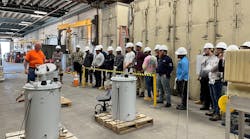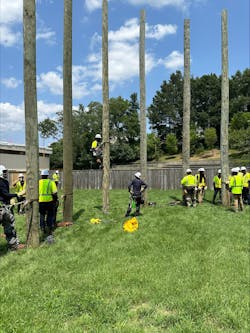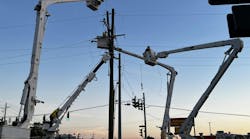Exelon’s more than 19,000 employees work hard every day to keep the lights on and gas flowing for 10 million customers across the Mid-Atlantic and in the Chicago, Illinois, area. Their goal is building a cleaner future for all by working to achieve net-zero operations-driven emissions across the company’s six utilities by 2050.
Pipes and wires are the core of what Exelon does, and it is round-the-clock work, critical to the operations and sustainability of the regions it supports. However, the company also knows there is other important work it must do that is vital to the success of its customers and the communities it serves — and that is human work.
Exelon has a responsibility to help its communities become stronger and more resilient. One important way it does that is through workforce development.
“Through our workforce development initiatives, we’re transforming communities for the better and working toward a more equitable economy — one job at a time” said Mike Innocenzo, president and CEO of PECO, an Exelon utility.
In 2019, Exelon launched a company-wide workforce development approach, bringing together and building on work that was already happening at each of its six utilities and corporate offices under one unified strategy. The strategy is targeted at enhancing economic stability and prosperity in the areas Exelon serves. It is about changing lives and transforming communities.
An External Strategy
Workforce development is often thought of in the context of job training. Yes, that is one component, but Exelon’s approach is primarily an external strategy intended to tackle the long-standing inequities that exist in underserved and under-resourced communities.
Exelon Vice President of Talent and Chief Diversity, Equity and Inclusion Officer Robert Matthews often describes it as “origination vs. destination.” The company is focusing on customers who live in or come from underserved or under-resourced communities; that is their origination. It uses workforce development to prepare them to compete for family-sustaining careers in the energy industry; that is their destination.
Jobs at Exelon, with its contractors and suppliers, and elsewhere in the local communities are all in play. Exelon wants its graduates to secure roles at companies that will pay them a wage that enables them to support their families, grow in their careers and thrive. This work is inextricably part of what Exelon is all about: helping to grow the energy workforce of the future, which will innovate to help serve customers and solve business problems and challenges that likely do not even exist today. But, more importantly, Exelon does this because it believes addressing economic inequities and enhancing prosperity in the areas it serves is the right thing to do.
The communities in the major cities Exelon serves — for example, Atlantic City, New Jersey; Baltimore, Maryland; Chicago; Wilmington, Delaware; Philadelphia, Pennsylvania; and Washington, D.C. — are rich with talent, creativity, vitality and enterprise. Unfortunately, they also experience significantly higher rates of unemployment than the nation’s average and higher rates of poverty, due, in part, to racial and economic inequities. According to the Economic Policy Institute’s (EPI’s) latest figures, in 2019, African American unemployment rates (6.1) exceeded white unemployment rates (3.0) by a ratio of 2-to-1. In fact, EPI has said that “one of the most durable and defining features of the U.S. labor market is the large and persistent disparity in unemployment that exists between Black and white workers.” Similar disparities exist among white and Latino workers as well.
Exelon believes it has a responsibility to do all it can to chip away at that disparity. Exelon’s President and CEO Calvin Butler said, “When we tolerate this imbalance of resources and opportunities that strongly privileges one group over another, we limit progress for individuals, communities and cities. And that limits progress for all of us.”
Butler pushes Exelon employees — and peers in the energy industry — to be all in on bringing about change, and he is right. With its wide range of family-sustaining jobs in fuels, electric power generation, transmission, distribution and storage, energy efficiency, alternative energy, cybersecurity, data analytics, innovation, customer experience and fleet electrification — the electric utility industry should, can and must be a strategic disruptor to economic inequities in underserved communities.
Brieanna’s Story
Exelon’s workforce development strategy is focused on addressing economic inequities and changing lives one career at a time. Take Brieanna Ware, for example. Brieanna lives in the Chicagoland area. She had worked in various customer service jobs for 10 years and was looking for a career change that would provide her, as a single mother, more stability and better growth opportunities. At a career fair at the YWCA, she learned about ComEd’s CONSTRUCT Infrastructure Academy, one of Exelon’s job training programs designed to prepare people for careers in the utility and construction fields.
Brieanna was surprised to learn the program offered women the opportunity to train in a variety of roles, including those in the field, which tend to be male dominated. She took a leap of faith and joined the construction field. After successfully completing the 11-week program, she now works at Aldridge Group, an electrical contracting company and ComEd partner, as an assistant project manager. Graduating from CONSTRUCT was a major milestone and turning point in Brieanna’s life — and her son’s.
“This is like an ‘us win,’ so it is exciting,” Brieanna said. “For the first time, I am proud of myself and just excited to move forward within the field.”
She also wants to spread the word about the opportunity that workforce development programs such as CONSTRUCT can provide women. “I stand behind empowering women and getting more women into a male-dominated field. This was something that really sparked my interest,” Brieanna said. “My goal is to get away from the stigma of construction being for just males — I would like to normalize this field and encourage other women to join.”
Brieanna’s story, and so many like hers, is why Exelon has positioned itself as a workforce development thought leader, championing economic equity and transforming the communities in which it operates.
Talent Pipeline
Exelon is steadfast in its commitment to develop an expanded, diverse talent pipeline in a variety of ways:
- Igniting STEM in young minds
- Eliminating barriers to economic empowerment
- Equipping work-ready adults and youth for family-supporting careers
- Engineering and encouraging new ideas in workforce development.
The company’s programs try to capture the imagination of future energy workers as early as possible, to get them excited about the STEM and technical careers of today and tomorrow. For example, its annual STEM Leadership Academy connects 10th and 11th grade girls to women working in STEM and other leaders; allows them to explore sustainability, energy efficiency, renewable energy, and climate change; and partners them with like-minded peers while working on a team energy challenge.
Since the academy launched in 2018, 1000 young women — and 80% students of color — have attended the summer program, and more than 400 employees have participated throughout the years in networking engagements and as coaches. The academy provides young women the opportunity to participate in mentor-guided, hands-on activities and experiments, preparing them for future careers in STEM, where women and people of color are traditionally underrepresented.
Exelon’s workforce development programs advocate for policies and practices that reduce systemic barriers and obstacles. They strengthen current and execute new approaches and partnerships with employers, nonprofits and community groups to expand training and job opportunities as well as help to create family-sustaining jobs.
Through its programs, Exelon also works with community partners to manage high-quality workforce training academies that prepare youth and work-ready adults who are unemployed, underemployed or changing careers for family-supporting roles in energy and STEM, such as the one from which Brieanna Ware graduated. They provide construction and skilled trades (CAST) and assistant mechanic operator (AMO) assessments preparation, offer transportation resources, and help participants to obtain their driver’s license. They bring people in to attend a climb school, where participants learn to safely climb utility poles. Or they pair them up with mentors as helpers in a pre-apprenticeship role, where they learn on the job while taking courses in safety, electric and gas basics, technical maintenance, tools and other essentials. They provide interview preparation, case management and so much more.
Measure Of Success
Exelon’s workforce development programs meet people where they are to help them get where they want to be. Its efforts to date have been successful by almost any measure.
Since 2019, when Exelon first synergized its programs under the current strategy, more than 1500 people have been hired in family-sustaining careers — either internally or externally with partner contractors or other companies in the industry. In 2022, the company invested US$16 million in its workforce development programs because its impact as a business leader is tied directly to the impact it makes every day for families.
For the last two years in a row, Exelon was recognized with the Center for Energy Workforce Development’s highest honor, the Chairman’s Award, at the national organization’s Impact Awards for Workforce Development Excellence. The company will continue to build on that honor by modeling community partnership and leadership for businesses across the utility industry. Exelon plans to do more and do it better.
Tanika Davis ([email protected]) is director, workforce development, at Exelon Corp., the nation’s largest utility company, serving more than 10 million customers through six fully regulated T&D utilities — Atlantic City Electric, Baltimore Gas and Electric, Commonwealth Edison, Delmarva Power & Light (DPL), PECO Energy Company (PECO) and Potomac Electric Power Company (Pepco).






